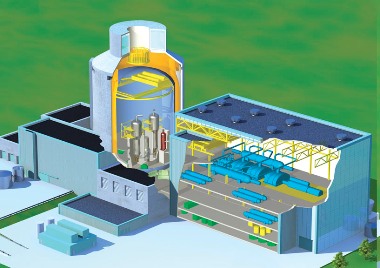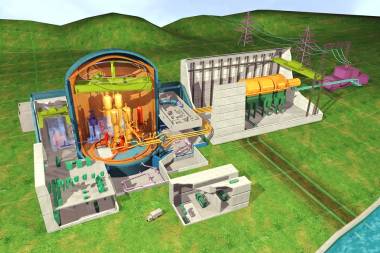UK reactor assessment update
23 June 2010
The latest progress report from UK nuclear safety regulators has made the best-case completion of the Generic Design Assessment process seem unlikely.
The Health and Safety Executive (HSE) said detailed examination of the Areva EPR and Westinghouse AP1000 was well underway and making reasonable progress with a rapidly increasing workrate.
 |
 |
| AP1000 and EPR |
However, it is facing a deadline of June 2011 when it is meant to issue the most meaningful design acceptance certificates that it can for the reactors. While most plant systems and features have posed no substantial problem, there remain some that could potentially have to be dealt with under separate processes which extend the overall GDA effort beyond June 2011. As well as acceptance certificates, the HSE said it is planning to publish "a suite of progress reports" in June 2011 "together with the requesting parties' resolution plans for any outstanding issues relating to GDA."
The reactor vendors were praised for stepping up the speed and scope of responses to the HSE's questions, but the body noted that further improvements were still needed to address every issue in time.
More information is required from the reactor vendors in a number of areas: fault studies, fuel design and electrical systems for AP1000; and mechanical engineering, environment and fuel design for the EPR. For both reactors the HSE wants more information on structural integrity as well as higher active waste and used fuel management. None of this implies known deficiencies in the reactors, but that the HSE requires more information and evidence before it is satisfied enough to certify the design features as safe enough for use in the UK.
Regulators remain confident that Areva will be able to demonstrate sufficient independence of safety and operational control and instrumentation in the EPR, saying the company has proposed changes that are expected to lead to an "acceptable position". This has been raised as a regulatory issue and confirmed as serious by joint statements by HSE with its Finnish and French counterparts. Another issue for Areva is to show the relative risk contribution from human actions and on this HSE hopes to learn from work undertaken in France where an EPR is under construction at Flamanville.
For AP1000 there remains a regulatory issue requiring more evidence that civil structures are sufficiently robust and Westinghouse has "a considerable amount of work to do" on the safety case for the control and instrumentation system. In the area of mechanical engineering the HSE wants more justification of some new-design squib valves, lifting equipment and testing of the control rod drive mechanism.
HSE has also asked for information on AP1000 reactor chemistry, such as how chemistry controls affect radioactivity in the primary coolant circuit. It said that delivery dates for this information could be too slow for the schedule and that Westinghouse has been asked to deliver faster.
UK government support for nuclear power lapsed in the 1990s and was only brought back in 2006 by concerns over security of supply, climate change and the retirement for the existing fleet. One result of this is an extremely tight timeline for regulatory approval of new reactor designs, backed up by private utilities' needs to get new build programs in motion as soon as possible, or at least over the next few years.
So far the UK market count Electricité de France's plans for four Areva EPRs to produce 6600 MWe at Hinkley Point and Sizewell with the first coming online before the end of 2017. EOn and RWE's joint venture Horizon Nuclear Power wants 6000 MWe by 2025 with the first unit at Wylfa. And Iberdrola, GdF-Suez and Scottish & Southern want to build 3600 MWe at a site alongside Sellafield.
Tight timelines
The HSE is cooperating with Electricité de France (EdF) and Areva on their plans to build at Hinkley Point C, on which they intend to break ground before the end of the GDA process. Within weeks, EdF, Areva and the HSE will meet to discuss key issues regarding EPR "before significant contracts are signed." Technical areas where exclusions from GDA could occur will be identified in Q3.
In June 2011 design acceptance confirmation (or an interim version) will be issued for both designs, together with resolution plans for any outstanding areas, "before any nuclear island safety-related construction commences."
"At a future date depending on a program for resolving outstanding issues," final acceptance could be issued which would then allow the HSE to grant official consent for nuclear island safety-related construction.
The HSE said it is working on a milestone program for Hinkley Point C1, for which EdF wants to begin nuclear construction in late 2012. Having been developed with the Environment Agency and the Department for Energy and Climate Change, this program should become the basis of programs for any future new build proposal.
|
Researched and written
by World Nuclear News